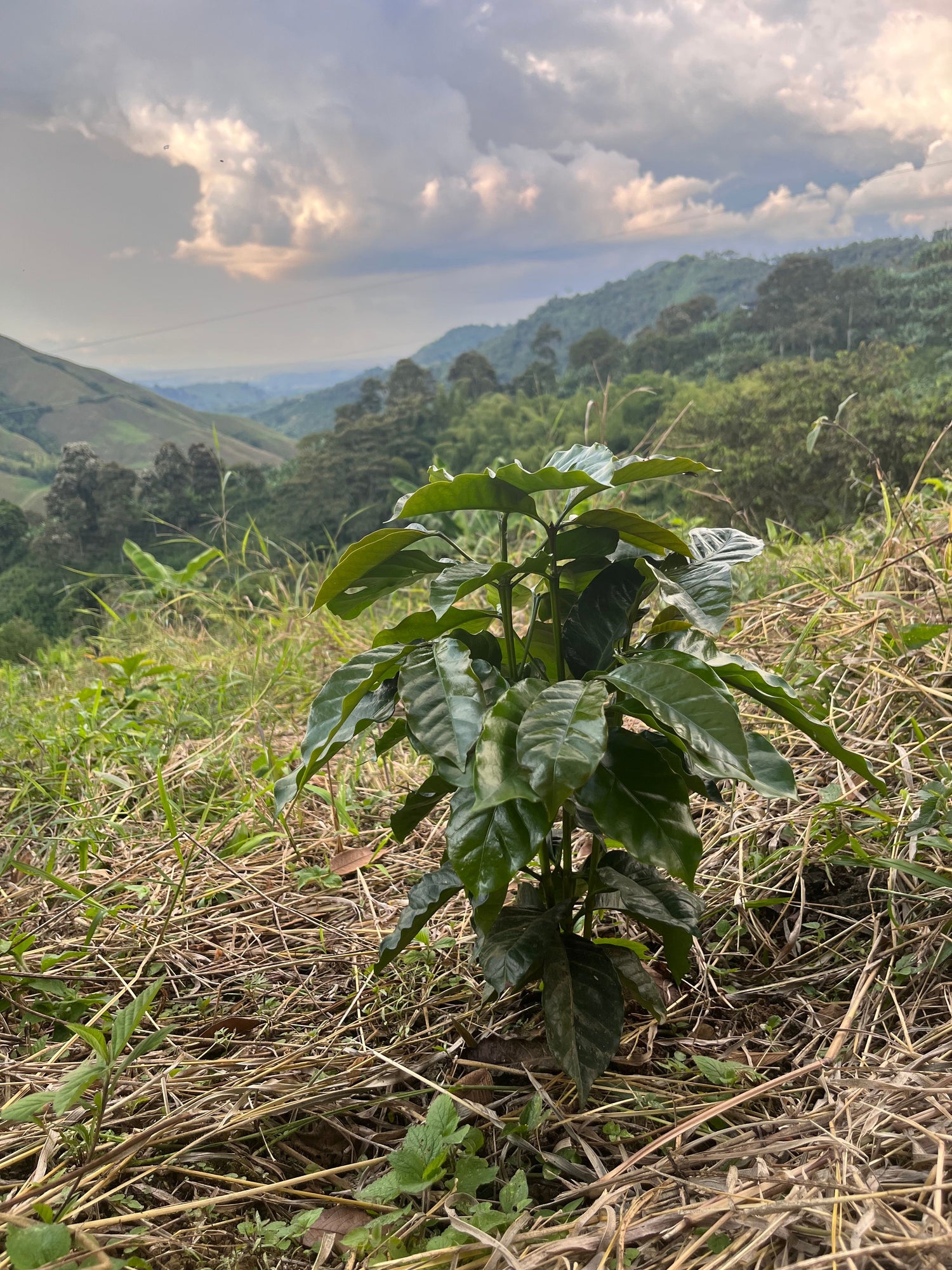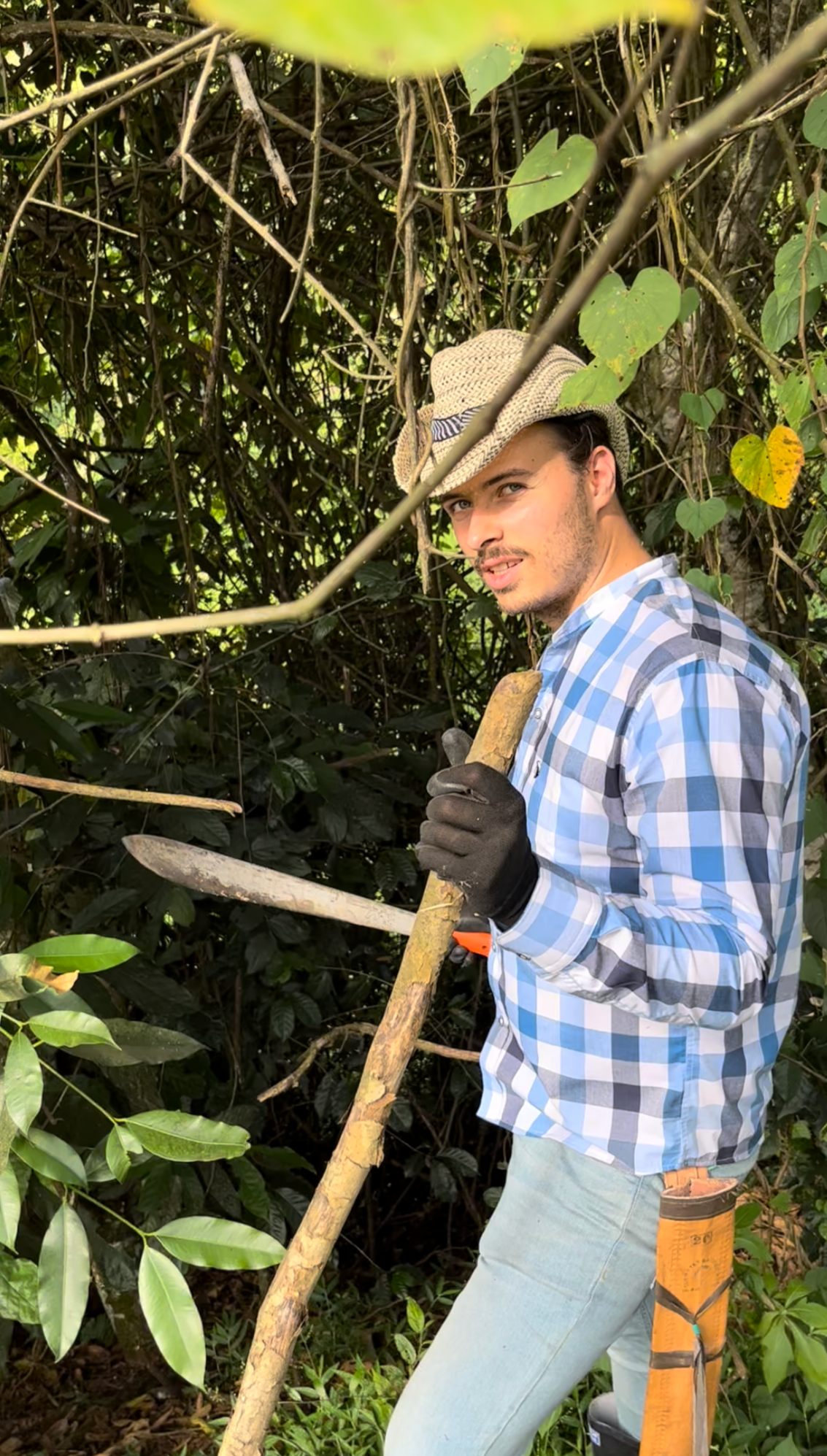This chapter can be divided into three categories:
- Daily challenges on the fincas
- Personal Challenges of the Rural Population
- Global Challenges: Demographic and Environmental
What challenges are there on the coffee plantations?
There are many challenges to overcome in everyday life, for those who grow and harvest the coffee but also for the finca owners.
For the finca owners, the main challenge is the noticeable climate change. The seasons that were once reliable are now in disarray. Rain is absent for unpredictable lengths of time. There has been no summer in the coffee zone in Colombia for the last two years, and therefore hardly any hours of sunshine. Storms and earthquakes threaten the plants, especially on the steep slopes.
For those who work on the fincas, the hard physical work is particularly noteworthy.

Can you imagine climbing around on steep slopes for 10 hours a day? Sometimes with a 50 kg sack on your back, harvesting coffee. In 35 °C and blazing sun and also in 10 °C in the pouring rain. Weaving your way between the coffee plants, where branches pierce your clothes, the moisture from the leaves soaks your clothes. And all this while insects like wasps, mosquitoes, horseflies and other tropical pests are constantly buzzing around you? This is often what the workers' everyday life looks like.
We have sometimes heard the following story from harvest workers about the coffee harvest in Colombia At the end of the day, they have to struggle back up the mountain with the 50 kg of harvest on their backs. Not an easy task when the ground is muddy. One wrong step and you fall or slide back down the mountain. If you're unlucky, you lose your luggage and the day's harvest rolls down the mountain and has to be collected again.
The coffee is earned with sweat and blood in the truest sense of the word.
What problems do coffee farmers and harvest workers or rural populations in general have?
Added to this are the personal challenges faced by the rural population. Here, too, a distinction can be made between finca owners and workers.
For coffee plantation owners in Colombia, growing coffee is often associated with high risks because they are dependent on many factors. From the perspective of an average small coffee farmer and his family on a finca, a year looks something like this:
First, you have to invest in the finca. Labor, fertilizer, new coffee plants, electricity, water, etc. Then you are dependent on the climate until the harvest time. Depending on the conditions, the harvest will be richer or poorer. The harvest time itself is very labor-intensive and therefore costly.
Once the coffee has been harvested and processed, the whole year is over, depending on the region where it is grown. A year full of expenses. And only now, through the sale of the green coffee, can money be earned. It is charged per kg, and the price is set by the world market or the large cooperative.
In summary, money was spent all year and it must be hoped that the price and the quantity generated can cover the costs afterwards.
Not many people can afford the pre-financing out of their own pocket. So a loan is needed and the finca is used as security for the bank. If the income at the end of the year is not enough to pay back the loan and interest, then the family's existence is seriously at risk.
From the workers' point of view, the work is very hard, risky and not very profitable. There are no fixed employment contracts and you have to get by from week to week. Without health insurance, pension insurance, etc.
The average wage is around €10 per working day. If the worker gets something to eat on the finca, this is deducted from the wage and around €5-6 is paid out. Due to the remote location, the workers essentially have to stay on the finca. This means they are separated from their families for weeks or months. Traveling is expensive and not possible every month with the wages they earn.
The personal problems on both sides of the rural population have global implications:
What are the long-term and global impacts of coffee farming problems?

Firstly, there are demographic effects. This type of work is very unattractive to the young population. People flee to the cities in the hope of better working conditions. Hardly any young person in Colombia can imagine working in the countryside or owning a finca.
That is why we hardly met any young people in the countryside. Our neighbours are in their late middle age. One of our neighbours, Don Alváro, is 80 years old and struggles to get to his finca every day. He has not found a successor in his family. Many finca owners have problems finding workers, especially during harvest time. When that happens, part of the harvest in which they had previously invested is lost. Another risk.
The personal problems also have consequences for the environment. Coffee cultivation is a business in which prices are calculated based on quantity. A simple solution to achieve higher yields on limited land is to cut down tropical forests and other plants.

Growing coffee in large monocultures with 10,000 plants per hectare instead of 2,000-3,000 plants per hectare. Instead of labor-intensive and therefore expensive manual care of the plants, simply spraying the coffee plants with chemical products to keep weeds and pests under control. And those who are driven by existential need hardly have the luxury of thinking much about the consequences.
Colombia's biodiversity is suffering. Insects such as bees are threatened. Tropical animals are losing their habitat. People around the world are losing the tropical forests that bind CO2 and produce oxygen.
With our Welttisch project, we want to tackle the problems at their root. That's why we bought our own coffee plantation in the coffee zone of Colombia, Finca "La Macarena". You can find out more about our exciting project here . Become a part of the Welttisch family. Together we can ensure that everyone, from the simplest worker on the finca to the end consumer, enjoys coffee in the long term. And we do this in harmony with nature, not against it.






